In Geneva, Eritreans Give Voice To Voiceless Compatriots
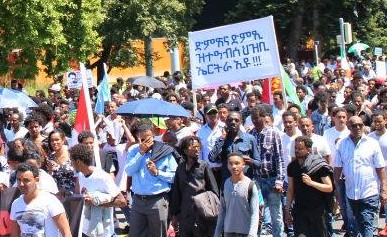
Last year in June, after Eritreans held the largest rally in the history of Eritrea’s opposition forces, there were questions if it was a one-time incident that could not be repeated and what would happen in June 2016. On June 23rd, Eritreans calling for end to impunity in Eritrea gave a resounding answer: it will be bigger. And with their answer, they gave hope to Eritreans that the Movement for positive change we all aspire for is within reach.
To be sure, the forces for status quo also had a large meeting two days earlier, on June 21, 2016. Their demonstration was beamed to Eritrea via Eri-TV and it had the usual suspects: Gnbot 7, an armed Ethiopian opposition group which is NOT in Eritrea (hush), the Mzungus (Thomas Mountain); the artists (aka future asylum-seekers); and a message expressed with passion: demanding accountability from our rulers is bullying our country; by standing with my government, I stand with Eritrea; the report of the Commission of Inquiry is a pack of lies.
But those of us who found ourselves on the same side with them some time ago also know the following: that the whole demonstration, down to the minutest detail, is a top-down operation, directed from the office of the political director of the ruling party, PFDJ. The fiat filters down to the mass organizations and the “community centers” and then to the foot soldiers. The slogans, the attires, the meeting venue, the message–nothing is organic about them. This is why, as they were happening, the director of the show, Yemane Gebreab, could speak with confidence of this “spontaneous” people power from his prepared notes:
“…Today, here in Geneva, thousands of Eritrean citizens are holding a peaceful march I stand with Eritrea, calling for a fair and just treatment of their country. Many of them are recent arrivals and former national service members, and they bring with them a petition signed by 200,000 people…”
This coming from a government that regularly holds “seminars” where government and party officials spend almost all of their time cataloging friends and enemies; a government which is constantly ordering Do-or-Die, Now-or-Never directives, threats of ex-communication from telemarketers at its embassies and “community centers” that are de-facto party branch offices.
When one contrasts the “End to Impunity”, and the “I Stand With Isaias Eritrea” demonstrations, the same pattern observed by the Commission of Inquiry on the testimony-providers emerges. Unlike those demanding accountability who are mostly young Eritreans, those who want to absolve the government from any accountability are either Eritreans who migrated to the West before 1991 (and certainly before the 2002 decision to extend military service indefinitely) or those who were born and raised in the Diaspora and have never served a day in military service, much less an indefinite one, or those who were sneaked out of Eritrea by their wealthy and/or well-connected parents. To slightly modify an Eritrean proverb, if you are wearing dentures you can grind sand with it. The pain is something you can understand rationally but can’t feel emotionally.
To be fair, that’s not the entirety of the “I Stand With Eritrea” movement. Some people genuinely believe that for the HRC to pressure the Eritrean government is a form of a double standard because it doesn’t pressure Saudi Arabia or Israel, for example. Some people genuinely believe, to use Brownyn Bruton’s words, “it’s bad in Eritrea, but not that bad.” Others believe that there is a different way to bring positive change, one that prods the government, slowly, in the right direction. Sticks don’t work but carrots may. In other words, the approach envisioned by the Universal Periodic Review (UPR.)
But to say all of the above is to disregard everything that has happened in Eritrea, and at the UN’s and Africa’s human rights organizations, in the last 15 years. It is to disregard what is supposed to happen when a country is deemed to show “persistent non-cooperation” and it makes a mockery of the UPR instrument.
Universal Periodic Review (UPR) and Eritrea
On March 15, 2006, the UN passed Resolution 60/251 authorizing the Human Rights Council to replace the thoroughly-corrupt Commission on Human Rights. How corrupt? Just to give us an idea, in 2003, Moammer Gaddafi’s Libya chaired the Commission on Human Rights, and the then-53-member body had Saudi Arabia, Syria and Eritrea as members. If you remember (and if you don’t please google it), Eritrea announced publicly that the banned Seventh Day Adventists church was about to be approved (three government officials told that to the media even as they knew that there was no chance that that was happening) and the 15-member African Bloc blocked every move to name and shame Sudan for ethnic cleansing in Darfur. And then elected Sudan as a member of the human rights commission and removed it from a list of countries that required special monitoring!
In those bad old days, our side was tiny and isolated. The halls of Geneva were full to the rim by proxies for dictatorships emphasizing the importance of social and economic rights over civil and political rights. That has still not gone away as even the new Human Rights Council affirms, in its preamble, that “all human rights are universal, indivisible, interrelated, interdependent and mutually reinforcing, and that all human rights must be treated in a fair and equal manner, on the same footing and with the same emphasis”–a fact driven home repeatedly by Yemane Gebreab.
So, how does the HRC work and how does it still give a huge advantage to authoritarian governments? For one thing, many of the good ideas on how to reform the Commission on Human Rights were defeated, chief among them being that only countries with decent human rights records should be admitted to the club. Now, as then, everybody can: whether you are the United States or Maldives, you are one country with one vote. Saudi Arabia and Sweden are the same in the eyes of HRC. Second, the blocs still remain: the African bloc, the East Europe block, the Latin America bloc so it is less about human rights than power politics. Third, it is classic UN: tortoise heaven. A country comes under review every five years and it is given suggestions: it accepts what it likes, it rejects what it doesn’t like and so long as it is “engaged” (actually shows up and occasionally writes laws it has no intention of implementing or makes promises it has no intention on delivering like the licensing of the Seventh Day Adventists), it is told that “_______ welcomes ______ of ______”. See you in 5 years. Wait, it would be nice if you would do a mid-cycle report. Are you going to? No? That’s fine too. So, see you in 2019.
So now that we all understand why Yemane Gebreab had a such a huge smile at his first press conference in Geneva, let’s see why he was fidgeting and uncomfortable this week. Of the 47-member HRC, 13 are reserved for African states which should be automatic supporters of Eritrea. Remember, this is the same bloc that blocked every UN move to take action against Sudan in Darfur. But the Government of Isaias Afwerki has done the impossible: gotten the African Union to take action against a fellow African state for the first time in its 50 year existence. Is that because the African countries just follow the orders of the US? If that is the case, why didn’t they when it came to war on Libya, war on Iraq, and sanctioning Sudan? I think it has something to do with the following and don’t take my word for it; take the words of self-described “long-standing Somalia expert” (AND soon enough Eritrea-expert), Bronwyn Bruton: “The Eritrean government didn’t help its case by giving military support to Al Shabab, a Somalia-based affiliate of Al Qaeda; it’s been under sanctions as a result.” The Government of Isaias Afwerki essentially ceded IGAD and COMESA to Ethiopia and, with the head of state choosing to quarantine himself at Adi Halo when the AU is having its heads of states meeting, he has increasingly made it easier for Africa to ignore him.
But what about the 92 recommendations that the Working Group of the Universal Periodic Group gave Eritrea which it has “accepted”? Doesn’t that show engagement? Well, if we are just going to count redundant recommendations, there were also 106 recommendations that Eritrea rejected. But what about the 92 recommendations it “accepted”? Some are calls for Eritrea to accede to treaties (genocide, torture, migrant workers, people with disabilities); some are non-controversial calls where the surprise is why it is taking the government so long (FGM, early marriage, domestic violence against women, children in armed conflict, gender equality); some are offers for help for capacity building; some are music to its ears (economic, social, cultural rights, food security, education, healthcare); and one deals with climate change. Of the 92, only half a dozen deal with civil liberties and administration of justice.
Now before we get to them, lets talk about one of the things that is frustrating Yemane and company. The UN, according to them, does not prioritize civil liberties and political rights over economic and social/cultural rights. Why is the Commission of Inquiry not taking note of the fact that we have made “great advances” in the economic, social and cultural rights of Eritreans? This is something testified to by another UN body, the United Nations Development Programme. So why is it not mentioned and why such single focus on civil liberties?
Here’s the thing: in its 2015 report, the CoI did note the achievements of the Millenium Development Goals (MDG). It’s on page 60 of the report: go ahead, check it: I will wait. That is, it took the claims of UNDP and the fact that Member States had complimented the government at the 2014 UPR at face-value. But, as happens with everyone who spends an extended period of time looking under the hood of the Eritrean government, this year, CoI said that since there are no external or internal mechanisms to validate these self-reported data, we are not ready to take it at face value given that the same UNDP (hi there, Christine Umutoni) is showing that Eritrea is ranked third from last on its Human Development Index (HDI). That’s right: third from dead last.
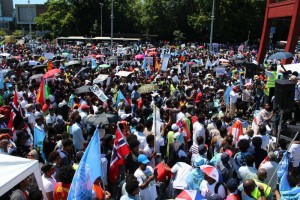 Let’s go back to the civil and political rights recommendations that Eritrea “accepted” in the last UPR. Here’s the problem for Eritrea’s ruling party in a nutshell. What it truly believes in is documented in its party platform which it calls “National Charter.” Constitutions come and go, but the charter remains. The Charter was suspicious of political parties and the manifestations of democracy–elections–when it was written in the good-old-days of 1994. Now, after what President Isaias Afwerki calls the “we have learned a lot” period–1998-present–it is absolutely hostile to democracy. According to the accepted wisdom of PFDJ, democracy, human rights, civil liberties are three Trojan horses used by Westerners to destabilize and control independent Africans. The problem for PFDJ is that to avoid being a pariah state, it has to accede to treaties and conventions that go counter to its belief system. The way out, from its perspective, is to say that you have ratified this convention and that treaty and then to use the fact that you have ratified the document as evidence that you are in compliance. It used this with the 1997 constitution for 8 years: we don’t oppress our people because the constitution that we drafted doesn’t allow us to. If we can go back to the UPR, we can have this discussion every 5 years: why are you coming up with all these country-specific mandates of Rapporteurs and Commission of Inquiries?
Let’s go back to the civil and political rights recommendations that Eritrea “accepted” in the last UPR. Here’s the problem for Eritrea’s ruling party in a nutshell. What it truly believes in is documented in its party platform which it calls “National Charter.” Constitutions come and go, but the charter remains. The Charter was suspicious of political parties and the manifestations of democracy–elections–when it was written in the good-old-days of 1994. Now, after what President Isaias Afwerki calls the “we have learned a lot” period–1998-present–it is absolutely hostile to democracy. According to the accepted wisdom of PFDJ, democracy, human rights, civil liberties are three Trojan horses used by Westerners to destabilize and control independent Africans. The problem for PFDJ is that to avoid being a pariah state, it has to accede to treaties and conventions that go counter to its belief system. The way out, from its perspective, is to say that you have ratified this convention and that treaty and then to use the fact that you have ratified the document as evidence that you are in compliance. It used this with the 1997 constitution for 8 years: we don’t oppress our people because the constitution that we drafted doesn’t allow us to. If we can go back to the UPR, we can have this discussion every 5 years: why are you coming up with all these country-specific mandates of Rapporteurs and Commission of Inquiries?
Moreover, when words don’t mean the same thing, and there is no mechanism to check, who would be the wiser? For example, in one of its replies to the UPR, the Government of Eritrea said that Eritrea’s prisons have mosques, churches (freedom of worship) and correspondence schools (right to education.) Can we, um, check? NO! That is interference in our internal affairs.
So, that is what “UPR constructive dialogue” sounds like. Here’s another example: UPR Recommendation: “ensure that any physical or moral harm against journalists or human rights defenders is investigated and that the perpetrators are duly prosecuted.” Eritrea’s Response: “The principle is acceptable but Eritrea rejects the implicit and baseless insinuation.” You mean this doesn’t happen? What about the journalists who have been made to disappear since 2001? They are not journalists, they are traitors. Oh. Let’s discuss this some more in 2019.
And now for the “interactive dialogue.” According to the ground rules, the State under review speaks for 20 minutes, then the HRC members states que up to speak for 3 hours, then the civil society members are given 2 minutes each to make their case. Or something like that.
Before the roll call, and my interpretation of what was said, I would like to thank my compatriots, in the thousands, who flocked to Geneva at their own expense to speak on behalf of the voiceless. I would also like to thank the members of the Civil Society–Veronica Almedom, Selam Kidane, Elizabeth Chyrum, Salah Ibrahim Aboray, Daniel Mekonnen and Helen Kidan–who represented the victims and spoke on their behalf.
| 22nd Meeting, 32nd Session, HRC Interactive Dialogue | ||
|---|---|---|
| Country | Block | Comments |
| Eritrea | Africa | Yemane Gebreab. This is what happens when you spend 25 years giving “seminars” and one-way-conversations; and you have a country without parliament: you are fish-out-of-water and want to jump out of your skin when you actually have to explain yourself. So you revert to the only thing you know: the Ethiopians are coming! The Ethiopians are coming! |
| EU | Europe | Don’t look now, but somebody is exiting. |
| Cuba | Latin America | Just focus on food, shelter, education. The West can huff and puff but in the end, they will deal. |
| UK | Western Europe | I would like to repeat Yemane Gebreab’s talking points about the 92 recommendations. OCHCR, UPR, UNDP, constructive dialogue. |
| Germany | Western Europe | We are with EU. Really. We take note that CoI said there are “Reasonable grounds” to believe crimes against humanity were committed. |
| Australia | Western Europe and Other | We are deeply disturbed. But we also welcome the release of political prisoners. We have no idea who those are but we welcome it. Oh, must be the Djibouti POWs. |
| Norway | Western Europe | We are long-time buddies of Eritrea. We knew them before they were cool. UPR, High Commissioner, Rapporteur, Civil Society. |
| China | Asia | We are rich but we have a huge statue of Mao. Get a clue. We hear the Eritreans have an expression that they use on children that we use on the whole country: as long as a child is fed and sheltered, gundi iznu. Pakistan co-signs. |
| Portugal | Europe | No improvement in human rights, reasonable grounds to believe. Refer to ICC. |
| Belarus | Eastern Europe | No country-specific mandates. Let’s talk. |
| France | Europe | Crimes against humanity, no improvement? Accountability now! |
| Djibouti | Africa | Hey Norway. Eritrea released 4 POWs, eight years after the war, and it hasn’t accounted for 13 and you want to congratulate them? Treaties? Conventions? They signed the convention on POWs, which they are ignoring. Action not words. We are drafting a resolution: accountability now. |
| Venezuela | Latin America | It is Bolivarian Republic of. No, we don’t like this country-specific mandate at all. Back to the UP, back to the UP, back to the UPR. |
| USA | Western Europe & Other | Our charge d’affaires was dressed as a Rashaida and dancing at the Nevsun party. We are all about access. Knock, knock. We are sending the Aide to the Assistant to the Deputy Undersecretary for East African affairs who has been on the job for 12 minutes. |
| Spain | Western Europe | Why are we discussing this? Take them to the Security Council and then the ICC. |
| Ghana | Africa | Look, Eritrea, we love you. But remember when you were rebels fighting dictators we couldn’t help because of the principle of “non-interference in internal affairs”? Well now that you are dictators, we can’t help tyrants because we have this new “principle of non-indifference.” We are for some accountability, via Africa. Look it up. The world has changed; check a calendar some time. |
| Botswana | Africa | Don’t just ratify treaties, use the instruments. We are not sympathetic to your cause: we are the kind of African country you mock: a multi-party African democracy. |
| Somalia | Africa | When we supported the Eritrean struggle for independence, it was on the premise that people should live free of fear, not to replace one form of fear with another. We will be co-sponsoring a resolution with Djibouti to demand accountability. PS: Isaias Afwerki, nobody likes you. |
| Ukraine | Eastern Europe | We are appalled by the report. We fully endorse CoI recommendation to send the accused to ICC and call on the UN to use all tools at its disposal. |
| Nicaragua | Latin America | Along with all our fellow commies, we support the right of countries to be as dictatorial as they wish, so long as they mention the proletariat. |
| Kenya | Africa | We support the CoI’s recommendation for an AU accountability mechanism. We did not forget what you did last summer, and the summer before that, Isaias. |
| Belgium | Western Europe | Fully accept CoI’s recommendation |
| Sudan | Africa | I know this will shock many of you, but our position is that no way should this case go forward. I also welcome the recent reforms by Eritrea. Also ICC hates black people. |
| Ethiopia | Africa | The crimes reported are appalling and shocking. Decisive action must be taken, and perpetrators must be held accountable. What? No, I am not talking about what we did to Oromo Ethiopians but what Eritrea did to its people! |
| Ireland | Western Europe | All Eritreans: please add Theodora Castan to the permanent list of Eritrea’s friends. In firm voice, she called for bringing those responsible to justice. Phew. Wished UK’s Julian Braithwaite was taking note. |
We will know, soon enough, in about a week, whether the Human Rights Council is, as Secretary General Ban Ki Moon envisions it, a place where “all victims of human rights abuses should be able to look to as a forum and a springboard for action” or a continuation of the corrupt Commission on Human Rights. Regardless of the outcome, I hope Eritrean activists for justice are now fully convinced that the seed for a broad-based movement for change is actually here.

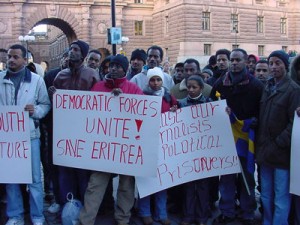

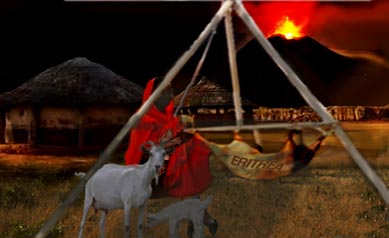
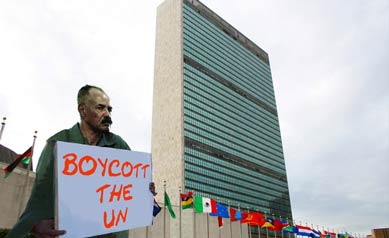
Awate Forum